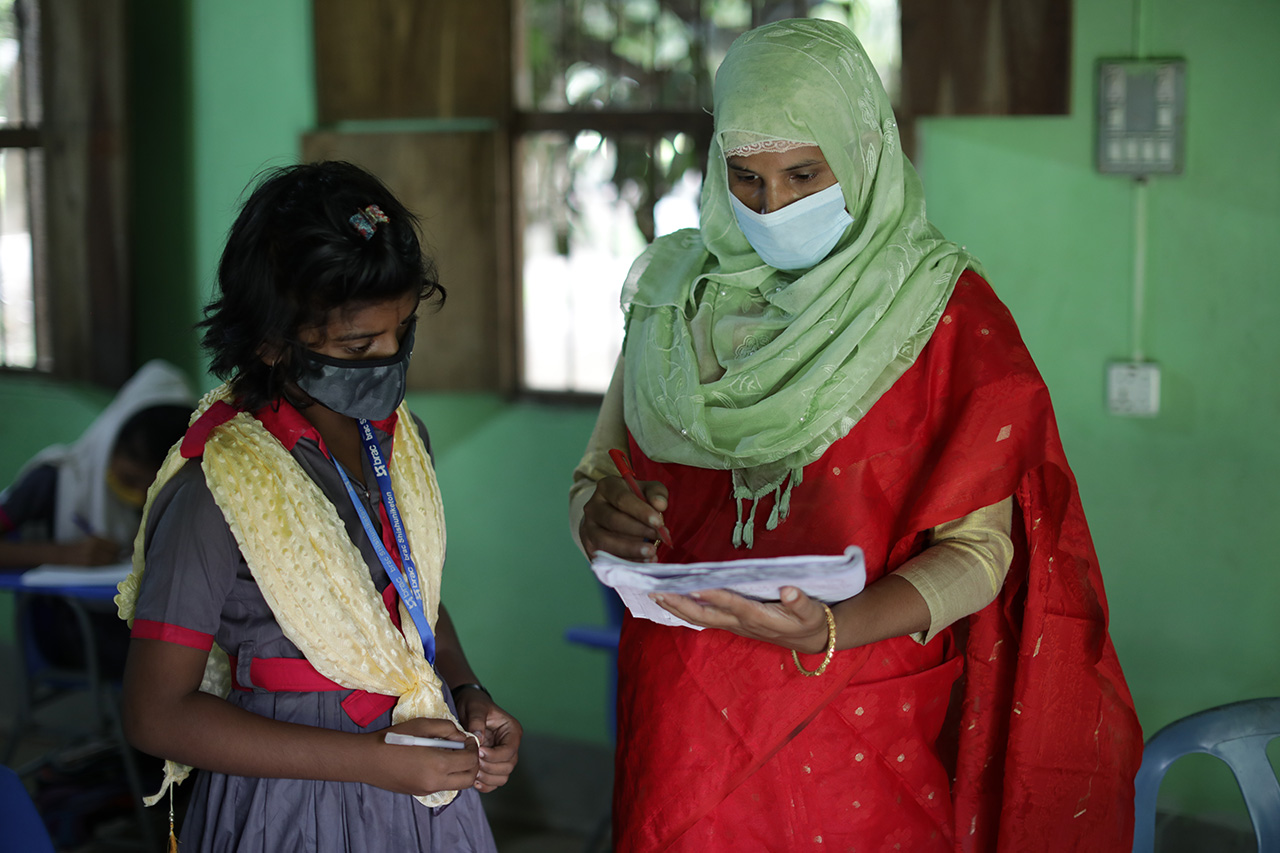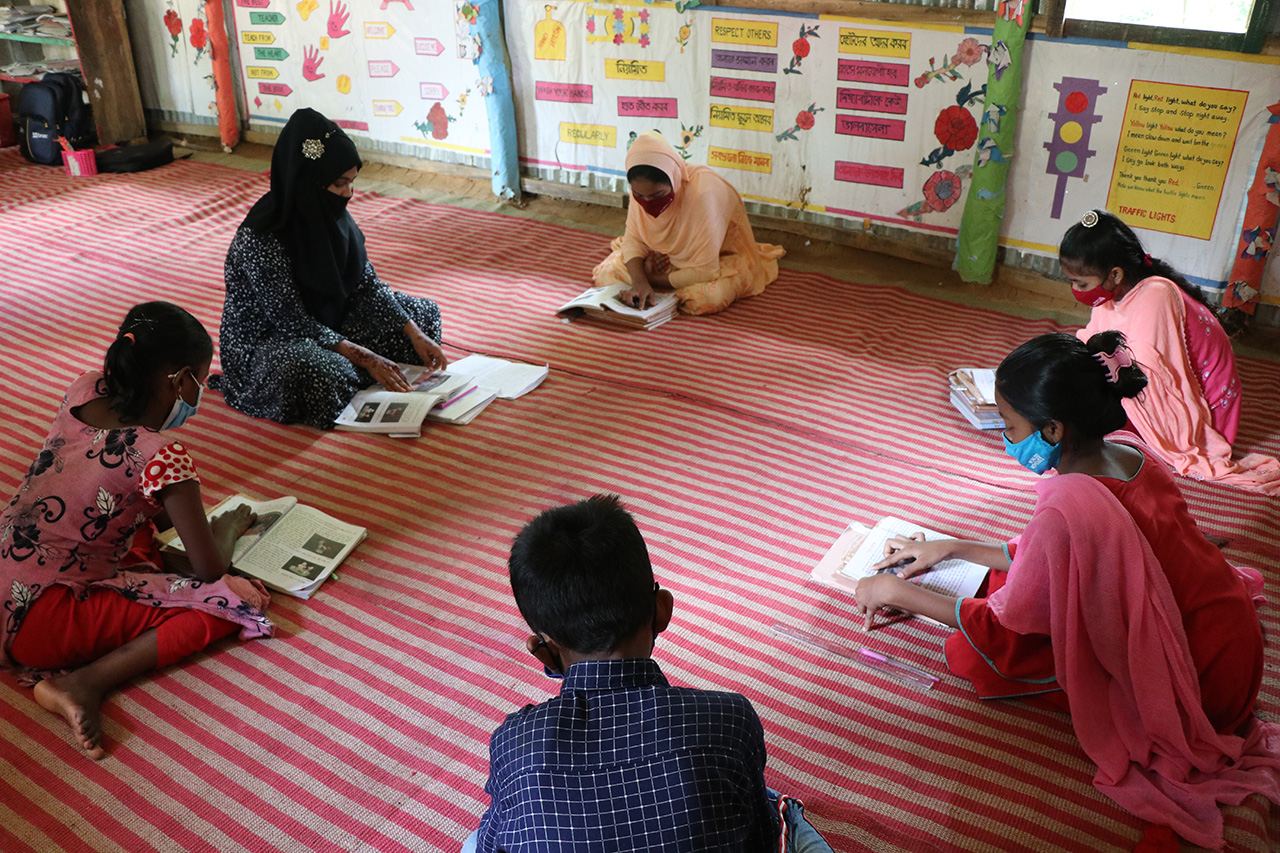After the initial ‘wellbeing’ week, teachers will conduct an initial formative assessment, focusing on the ‘must learn’ competencies from the last grade that the students attended in-person. The findings of the assessment will be used to identify the overall needs of the cohort, both in and out of the classroom, and to design a remedial intervention for the next 17-20 school days.
Students will learn in a whole group, small groups, peer groups and individually, as per their needs. Teachers will have flexibility to arrange extra times and days for additional learning, if needed.

A teacher reviews a student’s work at a BRAC school in Bangladesh. BRAC’s teachers are from the same communities as their students, which helps them to understand students’ personal circumstances. Photo credit: Abdullah Al Kafi © BRAC
The rest of the school year: Addressing learning losses
A second formative assessment will be conducted after the initial intervention, to understand the educational levels and remaining gaps of individual students. Students will be divided into groups according to the results – good, medium, and needing improvement.
Student learning groups, where stronger students support students who require additional attention, will be expanded outside classrooms, to create more opportunities to learn. Learning will be accelerated for as long as it takes to recover learning loss, using learning from models such as BRAC’s existing Bridge School.

A teacher works with her students in a BRAC school in Bangladesh. Photo credit: Sonali Chakma © BRAC
Will 18 months of phone schooling efforts pay off?
The shift to remote education was challenging for many during the pandemic, but, with only 8.7% of the poorest 20% households in Bangladesh having internet access at home, it was an impossibility for most BRAC students.
To ensure their education continued, teaching went remote – but offline. BRAC conducted classes through feature phones, home assignments, and individual home visits. All of this was supplemented by learning through community radio and television. A rapid appraisal conducted in 2021 shows that these measures supported students to continue learning.
The teachers who led these efforts, like Jharna Begum, are quietly hoping that the impact of their efforts, including walking for hours each day to individually visit students and making weekly calls, will start paying off this week.
Read more: Outside the digital world: How can remote learning be redesigned outside the internet?
BRAC’s network of schools is based on an innovative structure of ‘one-teacher, one-room’ primary schools. Each school is based within a community, with a woman from that community trained as a teacher, who takes a class of 25-30 students through primary school. The schools are complemented by a range of other educational services; pre-primary education, primary education through regular multi-classroom models, secondary education, community-driven libraries and youth services.
BRAC is initially reopening with just its continuing students. BRAC teaches in cohorts and, because it continued teaching through the pandemic, students in the pre-primary and primary levels who had started in 2019 and earlier were able to graduate. No new cohorts were started as school opening was suspended, and with the present academic year soon coming to a close, plans are afoot to start new cohorts early next year.
Watch more: Investing in the next generation: A look at BRAC’s work in education
BRAC started working in education in 1985. Its high quality, affordable, scalable schooling model has made it one of the world’s largest providers of secular, private education. Its holistic approach to lifelong learning, addressing educational needs from early childhood to higher academic levels supported over 15 million students across five countries to graduate to date.
To learn more about BRAC’s approach to investing in the next generation, visit the Education Programme’s website. Find more blogs on what BRAC is doing in education on The Good Feed.
Sarah-Jane Saltmarsh is the head of programme and enterprise communications at BRAC.
Cover photo: Abdullah Al Kafi © BRAC
This write-up received inputs from Safi Rahman Khan, director of BRAC’s education programme in Bangladesh, and Profulla Chandra Barman, programme head BRAC’s education programme in Bangladesh.
